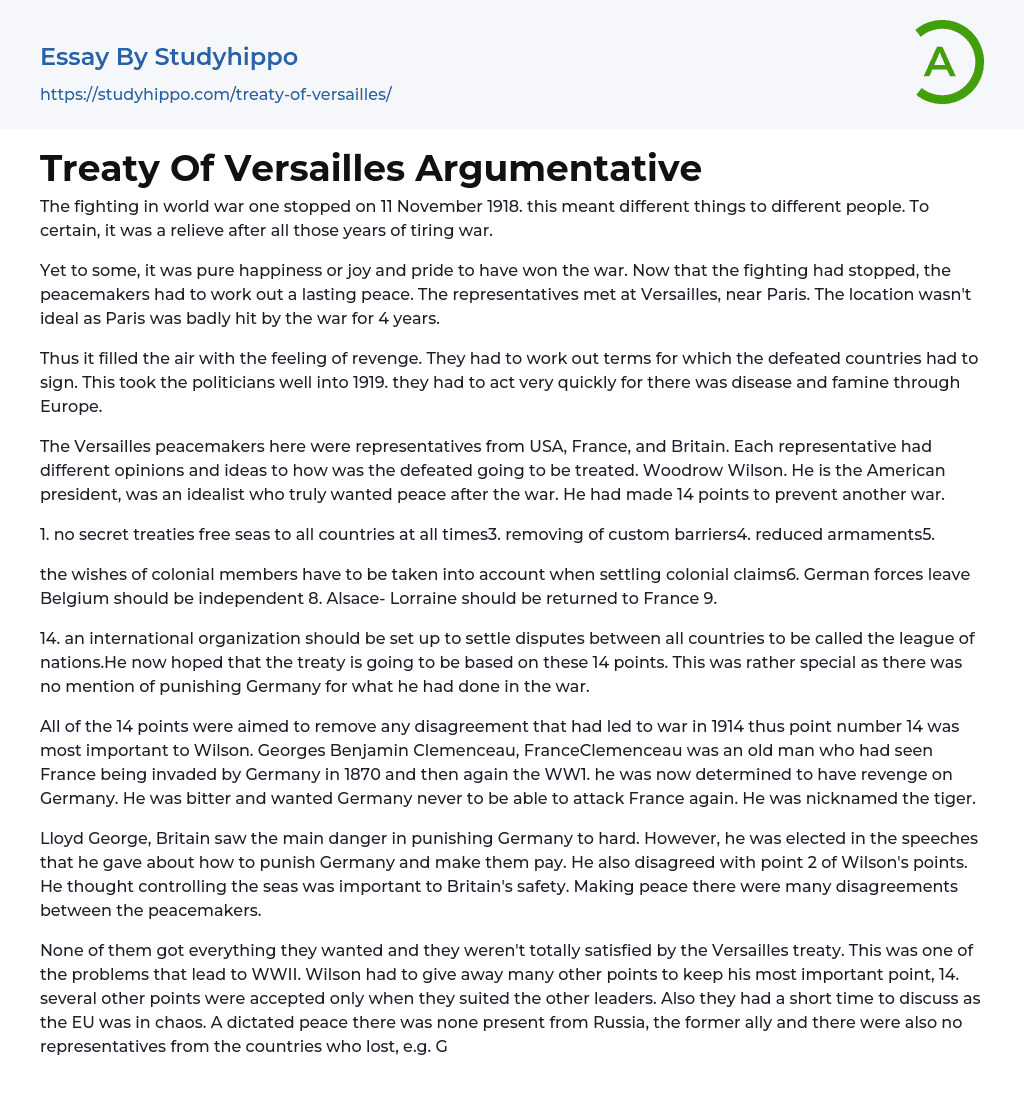The conclusion of hostilities in World War One occurred on 11 November 1918.
this meant different things to different people. To certain, it was a relief after years of tiring war. Yet to others, it brought pure happiness, joy, and pride for winning the war. With the fighting ceased, the peacemakers had to establish a lasting peace, leading them to gather at Versailles, close to Paris.
Due to Paris being severely affected by the war for a period of 4 years, the atmosphere was filled with a strong sense of vengeance. Negotiations to establish terms, which the defeated nations were required to sign, kept the politicians occupied until 1919.
Europe urgently needed action due to the presence of disease and famine. The peacemakers at Versailles, including representatives from the USA, France, and Britain, each held different opinions and ideas on how to treat the defeated party. Woodrow
...Wilson was among these representatives.
The American president, an idealist aiming for post-war peace, devised 14 points to prevent another war. These points included: 1. no secret treaties and ensuring free seas for all countries at all times.
1. Removal of custom barriers
2. Reduction of armaments
3. Consideration of colonial members' wishes when settling colonial claims
4. Independence of Belgium with the departure of German forces
The text suggests that Alsace-Lorraine should be returned to France on September 14th and proposes the creation of an international organization, named the League of Nations, to settle disputes between all countries. The author desires a treaty based on these 14 points, which exclude punishment for Germany's wartime actions. The primary goal of these 14 points is to eliminate conflicts that caused the war in 1914, with point numbe
14 being crucial to President Wilson. Georges Benjamin Clemenceau, an elderly individual who witnessed Germany's invasion of France in both 1870 and WW1, shares this viewpoint.
He had a strong desire for retaliation against Germany, expressing bitterness and a determination to ensure that Germany would never be capable of attacking France in the future. He earned the nickname "the tiger." Lloyd George, the British leader, believed that excessively punishing Germany posed the greatest threat. Nevertheless, he was elected based on his compelling speeches advocating for punishment and retribution against Germany. Additionally, he disagreed with the second point of Wilson's propositions.
He believed that controlling the seas was crucial for Britain's safety, but achieving peace was a challenging task due to numerous disagreements among the peacemakers. No one obtained all their desired outcomes from the Versailles treaty, leaving them partially unsatisfied. This issue contributed to the onset of World War II. In order to preserve his key objective, the Fourteen Points, Wilson had to compromise on several other matters.
The leaders of other countries in the EU were only willing to accept specific points if they benefited them, due to limited time for discussion and chaotic affairs within the EU. Regrettably, Russia, a former ally, did not contribute to achieving peace. Furthermore, Germany, Austria-Hungary, Turkey, and Bulgaria – all countries that had suffered losses during the conflict – were not adequately represented in the negotiations. Consequently, it can be inferred that a proper negotiation for the peace treaty did not occur.
The Germans considered the treaty highly unfair, labeling it as a dictak. Germany experienced significant losses, including a 13% reduction in land, 12% decrease in population, 10% loss of
coal reserves, 48% decline in iron resources, and a 15% drop in agricultural output. The Germans harbored intense anger, bitterness, and hatred towards the treaty. Their bitterness led them to sink their warships instead of surrendering them when required by the Allies. Furthermore, their armed forces were significantly reduced to only 100,000 soldiers—a blow to their national pride.
- Absolutism essays
- Appeal essays
- Bourgeoisie essays
- Contras essays
- Corporate Governance essays
- Corruption essays
- Democracy essays
- Democratic Party essays
- Developed Country essays
- Dictatorship essays
- Elections essays
- European Union essays
- Federalism essays
- Foreign essays
- Foreign policy essays
- Gentrification essays
- Hillary Clinton essays
- Income Tax essays
- International Relations essays
- John Marshall essays
- John Stuart Mill essays
- Left-Wing Politics essays
- Liberty essays
- Military essays
- Monarch essays
- Monarchy essays
- Political Corruption essays
- Political Party essays
- Political Science essays
- President Of The United States essays
- Public Service essays
- Red Cross essays
- Reform essays
- Republic essays
- Revenge essays
- Social Security essays
- Sovereign State essays
- State essays
- Supply essays
- Terrorism essays
- United Nations essays
- World Trade Organization essays
- Battle Of The Somme essays
- League Of Nations essays
- Treaty Of Versailles essays




